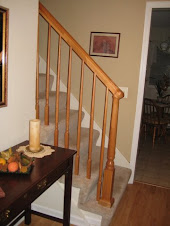So, you are ready to buy a home and want to understand basic points about a mortgage? Here is a simplified guide on important things you need to know regarding mortgage loans. For the full description of these terms, go to my source, The Smart Borrower Center on Lending Tree's website at lendingtree.com. Look under "Tools to help you borrow better."
Compare these important factors when choosing a mortgage:
1. Principal - The amount you are borrowing to buy your home. When you shop for mortgages, lending institutions will tell you how much they are willing to lend and help you determine what you can afford.
2. Type of mortgage - Usually fixed or adjustable rate mortgages. With a fixed rate, you usually pay the same amount each month for the life of the loan. This can mean less risk but a little higher interest rate. An adjustable rate mortgage (ARM) may provide a lower rate but change with the market, which can increase your risk and payment amount. Discuss options with your lender.
3. Interest rate - Consider the annual percentage rate (APR) which takes into account the interest rate as well as the other costs in the loan. Review with the lender how your interest rate will change if you choose an ARM.
4. Monthly payment - Think about the amount you can comfortably afford to pay each month for your mortgage. The lowest interest is not always the best deal. You will want to reduce your principal with each payment so you can build equity and use that money for a down payment when you move to a new home.
5. Mortgage term - the number of years your loan will be active. Shorter-term loans carry higher monthly payments, and longer-term loans carry lower monthly payments. The term of the mortgage can be set based on what you can afford to pay each month and how soon you wish to pay off your loan.
6. Discount points - These are offered by some lenders as a way to lower the interest rate. One point equals one percent. For each point, The Smart Borrower Center estimates yoy can lower your interest rate 0.25 percent. Think about how long you plan to keep your home when deciding what makes sense about paying discount points.
7. Lock-ins - A specific interest rate and possible discount points quoted by a lender. The market can change while you are looking for a home. Locking in the interest rate may help protect you against rising interest rates.
8. Closing costs - Fees charged when closing mortgage deals. This can run up thousands of dollars on what you must bring to the table at closing. Be sure to get a good faith estimate from your lender so there are no hidden costs.
Best wishes as you shop around for a good lender, good interest rates, and the best match for your individual needs. I can give you the names of reputable lenders in the Chattanooga, TN area who will help you find what you pre-quality for in a loan.
Saturday, July 24, 2010
Sunday, July 11, 2010
Foreclosure Alternatives - Possible Help with HAFA
Are you worried about foreclosure? Having trouble keeping up with your mortgage payments? Possibly even owe more than your home is worth? Has your income gone down or your mortgage payments gone up?
Homeowners who are struggling to keep up with mortgage payments may find help through the 2009 Making Home Affordable Program (MHAP). This program is designed to help stabilize the housing market and help eligible homeowners. There are alternatives that homeowners should investigate. A word to the wise.... Beware of scams - of those who would take advantage of you, pressure you and try to make money off your difficult situation.
One alternative is the Home Affordable Modification Program (HAMP), designed to make mortgage payments more affordable for eligible homeowners. This program can help homeowners avoid foreclosure and the associated drop in their credit scores. Read more at www.makinghomesaffordable.gov.
Another alternative is the Home Affordable Foreclosure Alternatives program (HAFA) which is designed to streamline short sales and provide a uniform process and standard forms. It also provides incentives to families and to their mortgage servicers. Eligible homeowners who sell their homes under HAFA can qualify for $3,000 to help cover moving costs to another home.
You may ask, "What is a short sale?" A short sale is an alternative for homeowners who cannot qualify to stay in their homes through loan modification. The servicer (represents the lender) allows the homeowner to list and sell their mortgaged property even when the net proceeds are less than the total amount due on the loan. With plummeting home values in many locations, this can be a time-consuming but more palatable alternative than foreclosure.
Please note, this is not hassle-free. However, if approved and successful in the short sale, a homeowner can get out of a difficult mortgage and maintain a more desirable credit profile than with foreclosure. Be warned that your credit score will still take a significant hit with a short sale. There are a lot of hoops to jump through, but the potential for a $3,000 incentive and less severe credit score repercusions can make the effort worthwhile. Homeowners who go through a short sale can become homeowners again perhaps in two years as opposed to the three or more after a foreclosure.
States may differ, and types of mortgages affect the approval process. Carefully consider your alternatives. You may have equity in your home and just need a break with a lower payment through a loan modification program. Or you may be struggling so much that you have missed payments and face foreclosure unless you can work with your lender. Alternatives to foreclosure are not easy. There are requirements that must be met, but you might be able to avoid foreclosure.
You will find a number of resources and links at financialstability.gov. Consult a tax professional and/or attorney for the particulars regarding your own situation. Deliberate youro alternatives carefully, and do not be drawn into scams.
Homeowners who are struggling to keep up with mortgage payments may find help through the 2009 Making Home Affordable Program (MHAP). This program is designed to help stabilize the housing market and help eligible homeowners. There are alternatives that homeowners should investigate. A word to the wise.... Beware of scams - of those who would take advantage of you, pressure you and try to make money off your difficult situation.
One alternative is the Home Affordable Modification Program (HAMP), designed to make mortgage payments more affordable for eligible homeowners. This program can help homeowners avoid foreclosure and the associated drop in their credit scores. Read more at www.makinghomesaffordable.gov.
Another alternative is the Home Affordable Foreclosure Alternatives program (HAFA) which is designed to streamline short sales and provide a uniform process and standard forms. It also provides incentives to families and to their mortgage servicers. Eligible homeowners who sell their homes under HAFA can qualify for $3,000 to help cover moving costs to another home.
You may ask, "What is a short sale?" A short sale is an alternative for homeowners who cannot qualify to stay in their homes through loan modification. The servicer (represents the lender) allows the homeowner to list and sell their mortgaged property even when the net proceeds are less than the total amount due on the loan. With plummeting home values in many locations, this can be a time-consuming but more palatable alternative than foreclosure.
Please note, this is not hassle-free. However, if approved and successful in the short sale, a homeowner can get out of a difficult mortgage and maintain a more desirable credit profile than with foreclosure. Be warned that your credit score will still take a significant hit with a short sale. There are a lot of hoops to jump through, but the potential for a $3,000 incentive and less severe credit score repercusions can make the effort worthwhile. Homeowners who go through a short sale can become homeowners again perhaps in two years as opposed to the three or more after a foreclosure.
States may differ, and types of mortgages affect the approval process. Carefully consider your alternatives. You may have equity in your home and just need a break with a lower payment through a loan modification program. Or you may be struggling so much that you have missed payments and face foreclosure unless you can work with your lender. Alternatives to foreclosure are not easy. There are requirements that must be met, but you might be able to avoid foreclosure.
You will find a number of resources and links at financialstability.gov. Consult a tax professional and/or attorney for the particulars regarding your own situation. Deliberate youro alternatives carefully, and do not be drawn into scams.
Labels:
Foreclosure alternatives,
HAFA,
loan modification,
MAHP,
short sales
Thursday, July 8, 2010
Outdoor Kitchens - Hot New Trend in Homes

Outdoor kitchens....you've seen them on HGTV. They are hot, and people who like to entertain often want this option; but the question remains, "What should you look for in an outdoor kitchen?"
The outdoor kitchen is attractive now, but what will it look like in 2 years? In 5 years? In 10 years? Are the products durable and weatherproof?
You find seating for lots of guests, but is the ventilation adequate and designed to keep smoke and odors away from guests? The space will not be pleasant if the design is not optimal. Who wants to sit outside and cough from smoke blowing back in their face or smell cooking odors rather than the great outdoors?
Assure the designer and installer will stand by their work. Check with resources and find a reputable contractor/designer/installer.
An outdoor kitchen can be an enjoyable bonus for your family. Whether you are planning to add one to your home or considering a home with this feature, select carefully; and don't make your decision based on looks or cost alone.
The outdoor kitchen is attractive now, but what will it look like in 2 years? In 5 years? In 10 years? Are the products durable and weatherproof?
You find seating for lots of guests, but is the ventilation adequate and designed to keep smoke and odors away from guests? The space will not be pleasant if the design is not optimal. Who wants to sit outside and cough from smoke blowing back in their face or smell cooking odors rather than the great outdoors?
Assure the designer and installer will stand by their work. Check with resources and find a reputable contractor/designer/installer.
An outdoor kitchen can be an enjoyable bonus for your family. Whether you are planning to add one to your home or considering a home with this feature, select carefully; and don't make your decision based on looks or cost alone.
Adapted from "Daily Real Estate News," July 2, 2010
Subscribe to:
Posts (Atom)






